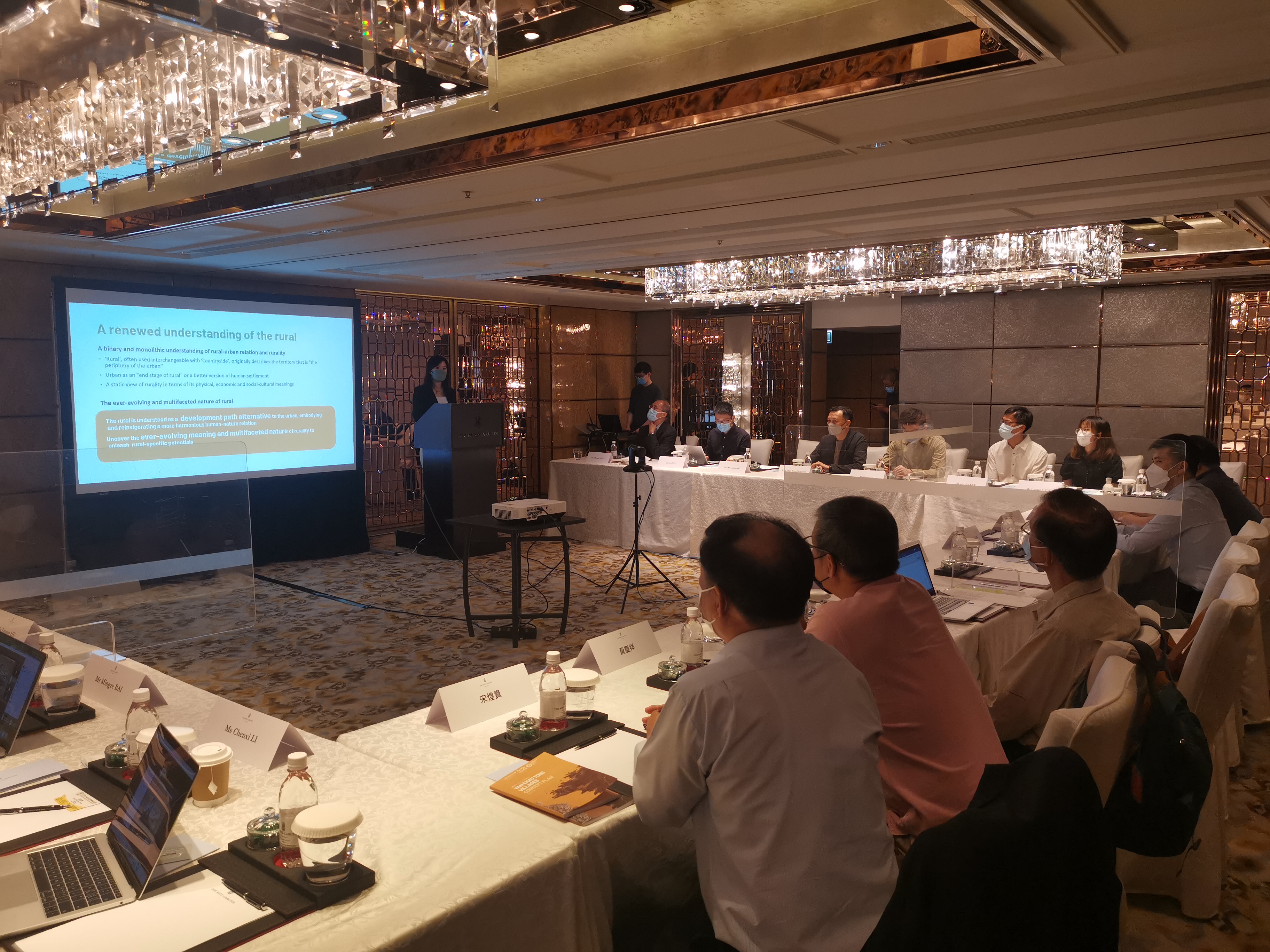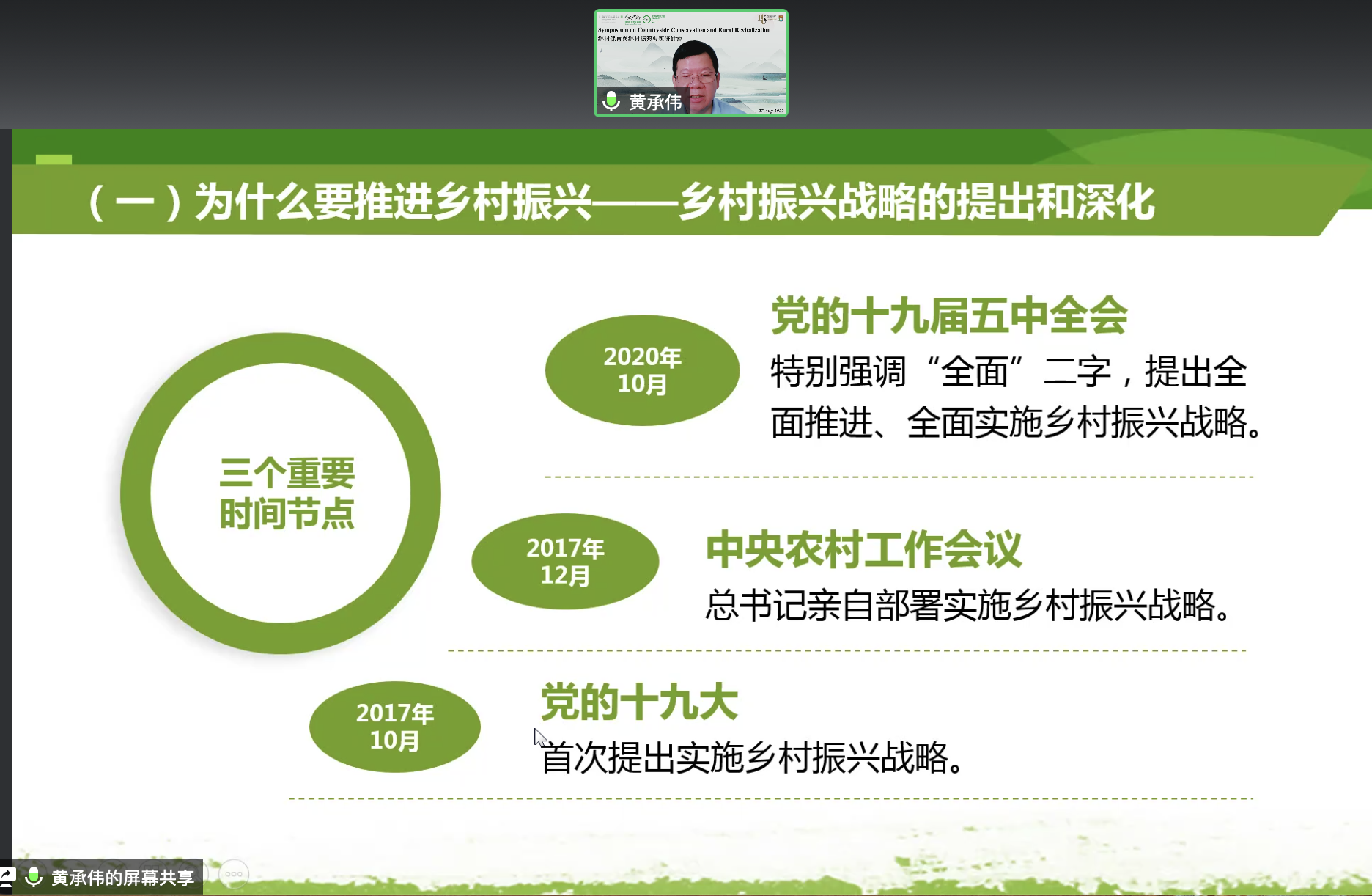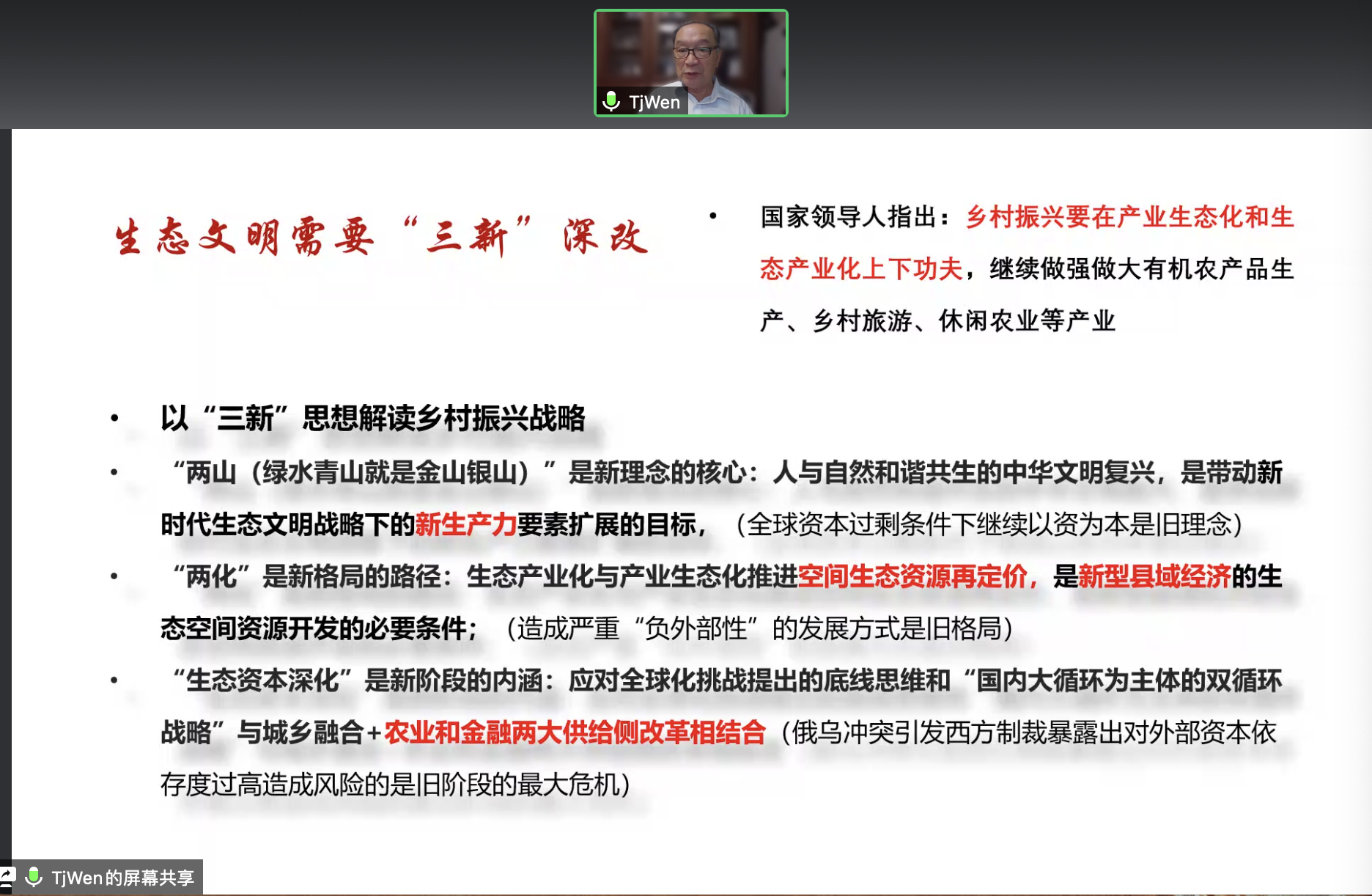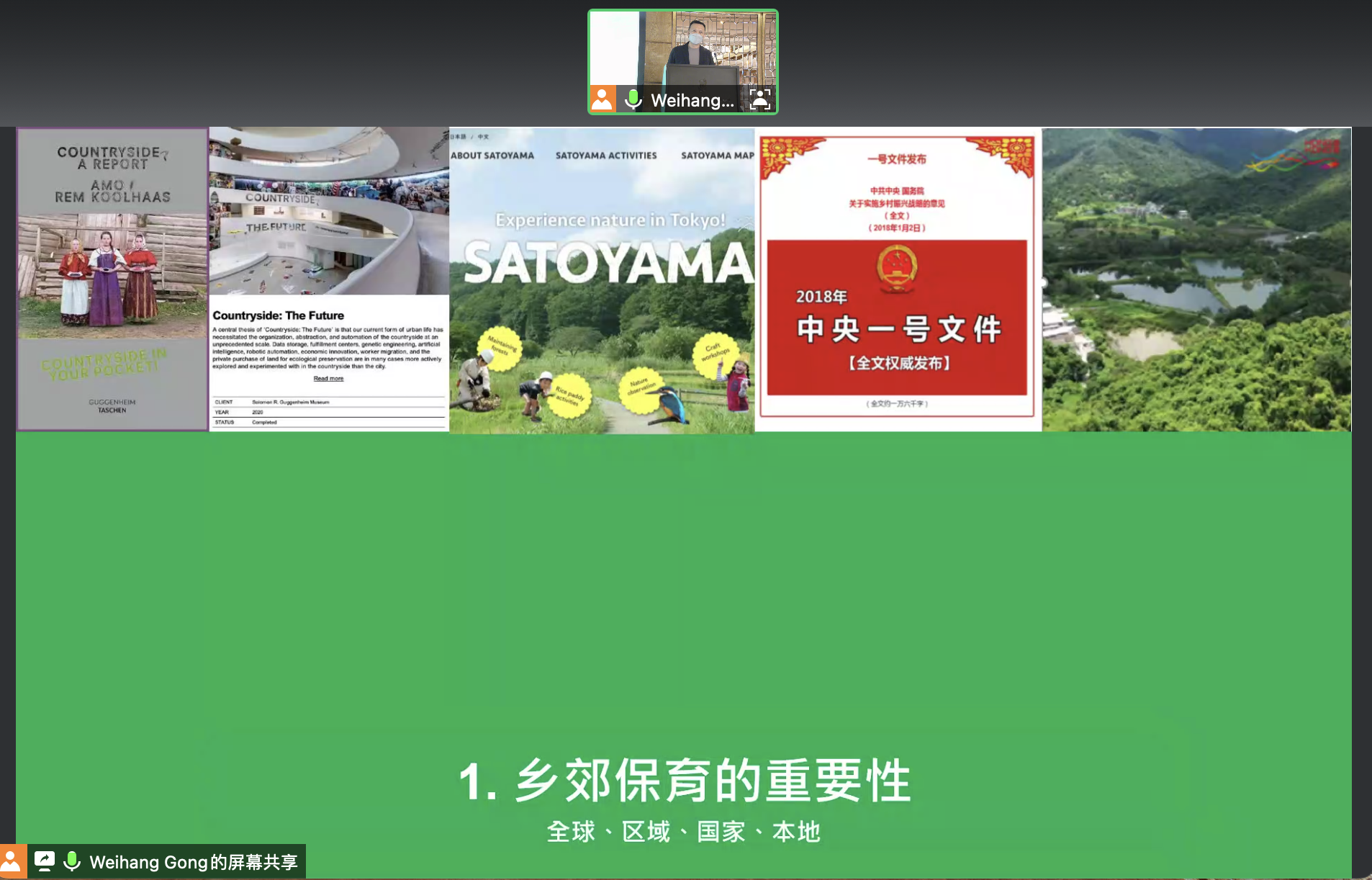
Symposium on Countryside Conservation and Rural Revitalizaion
鄉村保育與鄉村振興專題研討會
On 27 August 2022, the Symposium on Countryside Conservation and Rural Revitalization was successfully held as one of the events celebrating the 111th Anniversary of the University of Hong Kong (HKU). Co-organized by the Centre of Urban Studies and Urban Planning (CUSUP) of HKU and a Countryside Conservation Funding Scheme (CCFS) project team led by Prof Shenjing He, the Symposium brought together many experts in the field of rural research and rural revitalization from Mainland China and Hong Kong. It also served as a concluding event for the CCFS project ‘Towards Sustainable and Inclusive Conservation and Revitalisation in Hing Chun Yeuk Seven Villages, Kuk Po and Fung Hang, Hong Kong’, led by Prof Shenjing He, Head of the Department of Urban Planning and Design, HKU.
The seminar was chaired by Prof Bo-sin Tang, Director of CUSUP, HKU. Over 500 participants joined in physically or virtually, including government officials, scholars, urban planners, members from the tourism industry, and local villagers.

Prof Shen jing He: ‘Building a Modern Yeu kin Hong Kong’s Countryside: the case of Yan Chau Tong’
The first speaker was Prof Shenjing He, Head of the Department of Urban Planning and Design and Founding Director of the Social Infrastructure for Equity and Wellbeing (SIEW) Lab, HKU, and Principal Investigator of the CCFS project ‘Towards Sustainable and Inclusive Conservation and Revitalisation in Hing Chun Yeuk Seven Villages, Kuk Po and Fung Hang, Hong Kong’. With a vision of ‘Building a Modern Yeuk’, Prof He introduced the ‘Yeuk’ history in China as a basic self-organization system and social norm emphasizing mutual help and reciprocity, and the changes in the rural Yeuk organization in Hong Kong. By explaining the key programmes of agro ecosystem, eco-tourism, village circular economy, and community building, Prof He stressed the value of Modern Yeuk as a mode of polycentric governance for incorporating ancient ecological and social wisdoms into the modern socialeconomic system.

Prof Cheng wei Huang: ‘National Rural Revitalization Strategies in China’
The second speaker was Prof Cheng wei Huang, Director of the Poverty Alleviation and Development Centre of the State Council and Director of the Poverty Governance Centre at Peking University. From a policy-making perspective, Prof Huang explained the significance of rural revitalization strategy and the goals of rural revitalization, and presented key working areas, including consolidating the achievements of poverty alleviation, developing rural industries, implementing rural constructions, improving rural governance, deepening rural reform, and strengthening the overall leadership of the Communist Party, etc.

Prof Tiejun Wen: ‘The Transmutation of Ecological Strategy and Rural Revitalization’
The third speaker was Prof Tiejun Wen, Director of Rural Revitalization Centre at Peking University, Chairman and Chief Researcher of the Academic Committee of Institute for Rural Revitalization Research at Jinan University, and Executive Dean of Institute of Rural Reconstruction of China at Southwest University. Prof Wen stressed the importance of rural revitalization strategy in managing potential domestic and foreign risks from a macro political, economic, and financial perspective. Heal so mentioned the need to break away from the conventional narratives about urbanization and industrialization, and take human-centred ecological design as a transformation approach, so as to realize the integrated design in rural revitalization.

Prof Jinlong Liu: ‘Community Building in Rural Revitalization’
The fourth speaker was Prof Jinlong Liu of the School of Agriculture Economics and Rural Development, Renmin University of China. Through introducing diversified types of rural community building projects, Prof Liu explained that rural community mechanisms could help fill the vacuum of grassroots participation amidst rural governance dynamics in suburban areas. Prof Liu also mentioned that through the coordinated efforts from scholars in Hong Kong and Mainland China, the ‘China Innovative Urban-Rural Governance Research Network’ had been established to further the contributions from grassroots governance research to inform rural revitalization.

Prof Stephen Tang: ‘Countryside Conservation and Urban-Rural Symbiosis’
The fifth speaker was Prof Stephen Tang, Head of the Countryside Conservation Office (CCO), Environmental Protection Department of the Hong Kong SAR Government. Prof Tang introduced the development of Hong Kong’s rural conservation policy and CCO’S working strategies, that since its establishment in 2018, CCO has been committed to promoting implementation of minor improvement projects (such as village paths, environmental-friendly smart toilets, sewage systems, etc.); subsidising and supporting the Countryside Conservation Funding Scheme; and assisting in business licence applications (such as guesthouses and restaurants) in rural regions.

Prof Weijen Wang: ‘Kuk-Po Vision: Architecture, Landscape, and Community through an Acupuncture Strategy’
The sixth speaker was Prof Weijen Wang from the Department of Architecture, HKU. His research focuses on Chinese architecture and cities, including the transformation of courtyard typology, urban fabric and public space in historical and contemporary Chinese cities, and the typology of the Chinese temple. As the leader of another CCFS project, Prof Wang introduced his current working progress in Kuk-Po Village, such as renovating village schools for exhibitions, building ecological toilets, restoring ruined gardens and village houses. Prof Wang also expressed his hope to better promote the organic integration between low-density green space and high-density urban landscape in Hong Kong through acupuncture-style micro-renewal.

Dr Jin Zhu: ‘Planning and Practice in Yan Chau Tong 9 Villages’
The final speaker was Dr Jin Zhu, Assistant Professor from the Department of Urban Planning and Design and the Departmentof Real Estate and Construction, HKU. He is also the co-investigator of the CCFS Project led by Prof Shenjing He. In the Symposium, Dr Zhu introduced the research background, as well as the main research activities and outputs of the project as enveloped in ‘Three studies, Three Reports, and Two Interactive Platforms’. He presented the progressive research process from concept plan to action plan and facility plan, while also introducing the interactive platforms, i.e., the mobile application ‘Visit YCT’ and the project website: https://www.modernyeuk.hku.hk/.

RoundTable and Q&A Session
The round table discussion and Q&A session were chaired by Prof Shenjing He, who invited all the speakers to discuss how to better promote the incorporation of Hong Kong’s rural revitalization efforts into the national rural revitalization strategy and ecological civilization, and how to facilitate the integration of traditional rural ecological wisdom with modern social and economic systems. The chair and speakers, online audience, and on-site participants also shared their views on the future work of rural revitalization in Hong Kong and Mainland China.


Epilogue
In recent years, Hong Kong has heavily invested in a number of projects in the field of countryside conservation. However, the coordination with Mainland China in terms of policy-making and implementation is still lacking. This symposium provides an opportunity for experts and scholars from Hong Kong and Mainland China to exchange ideas, allowing rural stakeholders from different backgrounds to engage in dialogue at both theoretical and implementation levels. The CCFS project team hopes that policymakers in Hong Kong and the Mainland will continue the dialogue after this symposium, so as to better understand and evaluate their work from both sides. The project team will also make further efforts to promote the incorporation of Hong Kong’s rural conservation work into the overall development framework of the national rural revitalization strategy and ecological civilization construction.
8月27日,香港大學111週年校慶慶典系列活動“鄉村保育與鄉村振興專題研討會”成功舉辦。該活動由香港大學城市研究及城市規劃中心、何深靜教授主持的鄉郊保育研究項目團隊聯合主辦,聚集了香港和內地多位鄉村研究與鄉村振興領域的專家。本次研討會也是香港大學城市規劃及設計系系主任、SIEW Lab實驗室創始人何深靜教授主持的香港鄉郊保育資助計劃研究項目“邁向永續性及包容性的香港慶春約七村及谷埔、鳳坑鄉郊保育與復育研究”的結題會議。
本次研討會由香港大學城市研究及城市規劃中心主任鄧寶善教授主持,共有500多位參會者在現場或透過網絡平台參與本次研討會,包括政府官員、學者、規劃師、旅遊業界人士、本地村民等。

何深靜教授:“構建現代鄉約:香港印洲塘的鄉郊復育”

第一位報告人是香港大學城市規劃及設計系系主任兼SIEW Lab創始人,也是鄉郊保育資助計劃研究項目的負責人何深靜教授。何教授以構建現代鄉約為主要論點,向觀眾闡述了鄉約作為中國古代基本的自治單元和社會規範,強調鄰里之間互助互惠。何教授也介紹了香港鄉約的歷史以及鄉約結構變遷。透過生態農業、生態旅遊、循環經濟、社區建設等主題方案,闡述了現代鄉約作為多中心管治的一種模式,有助於將古老的生態和社會智慧融入現代社會經濟體系。
黃承偉教授:“中國的鄉村振興與戰略”

第二位報告人是國務院扶貧辦中國扶貧發展中心主任,北京大學貧困治理中心主任黃承偉教授。黃教授從政策現狀的角度梳理了鄉村振興戰略的時代意義,解讀了鄉村振興的目標,以及重點工作領域,包括鞏固脫貧攻堅成果、發展鄉村產業、實施鄉村建設行動、加強改進鄉村治理、深化農村改革、加強黨的全面領導等等。
溫鐵軍教授:“生態化戰略轉型與鄉村振興”

第三位報告人是北京大學鄉村振興中心主任,暨南大學鄉村振興研究院學術委員會主席兼首席研究員,西南大學中國鄉村建設學院執行院長溫鐵軍教授。溫教授從宏觀政治經濟金融的角度闡述了鄉村振興的戰略當今作為抵抗國內外風險的里程碑式意義。溫教授還提到了必須跳脫舊有城市化與工業化的框架,將以人為中心的生態化設計作為轉型思路,從而實現鄉村振興的整合設計。
劉金龍教授:“鄉村振興中的社區建設”

第四位報告人是來自中國人民大學農業與農村發展學院的劉金龍教授。劉教授透過介紹參與的多類鄉村社區建設課題,闡述了在城郊型鄉村治理變遷背景下,鄉村社區機制的建立有助於填補基層參與的空缺。劉教授還提到了透過香港內地學者與高校的合作,建立了“中國城鄉治理創新研究網絡”,使基層治理研究更好地助推鄉村振興。
鄧文彬教授:“鄉郊保育及城鄉共生”

第五位報告人是香港特別行政區環境保護署鄉郊保育辦公室總監鄧文彬教授。鄧教授向觀眾介紹了香港鄉郊保育政策的發展以及鄉郊辦的工作方針。鄧教授提到,鄉郊辦自2018年成立以來,致力於推廣小型改善工程(如鄉村步道、智環保公廁、污水收集系統等);資助和推進鄉郊保育資助計劃;以及協助完成民宿與食肆牌照申請等工作。
王維仁教授:“谷埔願景:建築,景觀,和社區的針灸療法”

第六位報告人是香港大學建築系王維仁教授。王教授的研究領域為合院建築形態演變、中國寺廟建築形態、傳統及當代中國城市肌理與城市空間。作為另一項鄉村保育資助計劃項目的主持人,王教授為現場觀眾介紹了他目前在谷埔村的工作,例如修建鄉村學校以供展覽、生態廁所、廢墟花園、村屋重建等。王教授期盼透過針灸式的微更新,更好地促進香港低密度綠地與高密度城市用地的有機融合。
朱金博士:“印洲塘九村的規劃與實踐”

最後一位報告人朱金博士是香港大學城市規劃及設計系、房地產及建設系助理教授,他也是本次鄉村保育資助計劃項目的共同研究者,他為觀眾介紹了該項目開展的研究背景,以及項目的主要工作與成果“三個研究版塊,三份研究報告,兩個互動平台”。重點向參會者展示了從概念規劃,到行動計劃及設施規劃的遞進關係,以及本項目的兩個互動平台,即Visit YCT應用程式及項目網站https://www.modernyeuk.hku.hk/。
圓桌會議及自由問答環節
最後的圓桌會議及問答環節由何深靜教授主持。何教授邀請所有報告人就如何促進香港的鄉村振興工作與國家鄉村振興戰略及生態文明的融合、鄉村傳統生態智慧與現代社會經濟體系融合進行討論。此外,主持人、網絡觀眾及現場參會人員分別就香港及內地鄉村振興的未來工作進行了觀點分享。


結語
近年來,香港在鄉村保育方面投入大量資金與項目,但仍然缺乏和內地實施經驗以及中央政策方面的對接。是次研討會為香港與內地的專家學者提供了一次重要的交流機會,讓不同背景的鄉村工作者在實踐和理論層面進行對話。該項目組希望透過此次研討會,使得香港與內地的政策制定者加強對話,從而更好地瞭解和評估雙方的鄉村保育工作。項目組也會進一步努力推動將香港的鄉村保育工作納入到國家鄉村振興戰略和生態文明建設的總體發展框架中。